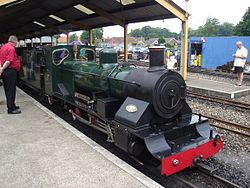Bure Valley Railway
| Bure Valley Railway | |
|
Norfolk | |
|---|---|
 Locomotive Spitfire at Aylsham | |
| Gauge: | 15" |
| No. of stations: | 5 |
| Track: | 9 miles |
| Information | |
| Operated by: | Bure Valley Railway |
The Bure Valley Railway is a 15" minimum gauge heritage railway in Norfolk. It runs for 9 miles from Wroxham to Aylsham, all within the Norfolk Broads.
This nine-mile track is Norfolk's longest railway of less than standard gauge. It uses both steam and diesel locomotives. There are intermediate halts at Brampton, Buxton and Coltishall. The line has 17 bridges, including a girder bridge 105 feet long over the River Bure by Buxton, as well as Aylsham Bypass Tunnel under the A140 at Aylsham.
History
The railway is built on the trackbed of the East Norfolk Railway. The ENR started in 1877 when the East Norfolk Railway opened from Norwich to Cromer, with an extension from Wroxham to Aylsham in 1880. The ENR was taken over by the Great Eastern Railway in 1882, which was amalgamated into the London & North Eastern Railway in 1923. The railway was nationalised in 1948.
In 1952 the passenger service stopped, but the freight service continued. Buxton Lamas station, as it was then known, closed for goods in 1964, and Aylsham and Coltishall in 1974.
Freight trains continued to run over the line after this for two principal sources of traffic. The line west of Aylsham via Cawston and Reepham originally went further to a junction at County School Station; by this time it instead turned south on a new curve at Themelthorpe to join a fragment of the old Midland and Great Northern system to reach Lenwade and Norwich City.
Coal traffic continued to be carried from Norwich Thorpe via Aylsham to Norwich City - a long trip all around Norfolk just to cross the city. There was also regular traffic from Lenwade in the form of concrete building components.
This traffic ended in 1981 and the line through Aylsham formally closed on 6 January 1982. A weed-killing train ran in 1983 and track-lifting trains ran the following year.
Re-opening
The Bure Valley Railway opened on 10 July 1990, and a long distance footpath (rail trail) opened alongside it in 1991. The Aylsham Bypass Tunnel on the Bure Valley Railway is Norfolk's only operational railway tunnel, and it carries the railway under the Aylsham Bypass, replacing the original standard gauge level crossing. Cromer Tunnel in Cromer, the only other surviving railway tunnel in the county, is disused.
Locomotives
When the railway first opened, several locomotives were hired from the Romney, Hythe and Dymchurch Railway, including Black Prince, Samson and Winston Churchill.
Operations
The track is laid to a gauge of 15 inches. The railway is operated by a fleet of five steam and three diesel locomotives. Passenger rolling stock consists of 26 fully enclosed bogie carriages and two four-wheel brake vans. Trains always include carriages capable of accommodating wheelchairs. Approximately half the carriages are equipped with electric heating, for winter services.
On Monday 30 May 2011 a train on the line suffered a derailment at Brampton, during which wheels from one of the coaches were reported to have come up through the floor of the vehicle.[1] The Rail Accident Investigation Branch were called in to conduct a preliminary examination into the incident,[2][3] and found it to have been caused by the failure due to metal fatigue of an axle journal that had been welded several years previously (when the railway was under different management). Following this accident all wheels of this design were identified by the railway and scrapped, being replaced by new wheelsets.[4]
The Friends of the Bure Valley Railway
The Friends of the Bure Valley Railway (FoBVR) is the volunteer supporting group for the Bure Valley Railway. It owns locomotive number 4 and supports the railway financially and with regular working parties of volunteers. There is a hut at Aylsham which sells donated bric a brac,second hand books and magazines during the season to raise money to support the railway. A second hand book, record and DVD shop is open at Wroxham station.
Outside links
| ("Wikimedia Commons" has material about Bure Valley Railway) |





